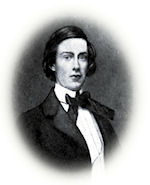Kosciusko Farm,
August 25th, 1861.
My dear Mother:
I am seated writing my usual Sunday letter, happy to state that my spirits are good and health excellent, as Uncle Charles will confirm. I was out drilling my men yesterday, when my attention was attracted by somebody nodding to me in a familiar style — a second glance told that it was Uncle Charley, and no other. I was much pleased at his kindness in looking me up, as well as to see him again. You will find he is looking well, and will learn from him that he entertains Republican sentiments of so decided a stripe that I, who was formerly a sort of an abolitionist, am obliged to confess myself a conservative in comparison. I received from Thomas a very pretty present, through the Express office, a few days ago. It consisted of a case containing knife, fork, spoon and cup — things which I shall find highly useful when on the march. When in Virginia before, provided with no such conveniences, fingers were obliged to adapt themselves to the performance of all the varied functions of “table services.” You ask for my address! I never can give you any fixed address, as no Regiment knows where it will be twenty-four hours in advance, but anything directed to the 79th Regiment, N. Y. S. M., Washington, will be forwarded without difficulty. I was in earnest in wishing that I was connected with some New England Regiment, but not in earnest as regards any intention of deserting my present post because of any difficulty attending it. As long as my friends stick by the 79th, I shall not surely be less faithful than are they. The wish to change arose from a desire to take part in the approaching battle to be conducted by McClellan, in which, it seemed probable, the 79th would be too much crippled to take any prominent part. Our Regiment is, however, now rapidly recovering from the effects of the battle and the intrigues of the old rum-selling officers now happily resigned. I have some responsibility resting upon me, as I am detailed to take sole charge of one of the Companies. I have the duties of Captain, 1st Lieutenant, and 2d Lieutenant, all combined, at present to perform, so I have little right to think of abandoning my post. In confidence I may add that possibly five or six of us may be transferred to a new Regiment by the Secretary of War. The Regiment would be under his patronage, and be called the “Cameron Highlanders.” In this new Regiment I most likely would be assigned the post of Captain. However neither say or think anything about this, as it is by no means determined yet. The letter from Fräulein Mathilde contained the kind wishes of the family, and an invitation to be present at her wedding which is to take place on the 1st of September. I find I have grown rusty in the German language, so that I had no little difficulty in deciphering the young lady’s epistle.
Have I written you that we are now encamped on Kosciusko’s farm? It is a pleasant spot, but damp. I hear we are to be marched off somewhere to-morrow. Report names Georgetown as our probable destination.
Uncle Charles is still in town I hear, but I cannot leave camp to visit him.
I will take the photograph question into consideration when we get paid off. Tell Lilly she must accept thanks and love for her kind letter, but I do not mean to answer it until after some success occurs.
Thank Mary for her kind intentions regarding writing me. Love to the little ones. Ask Will if he wants to be a soldier. Turly shall be made a Congressman, and get appointed Chairman of the Military Committee.
Love to all.
Believe me,
Very Affec’y.,
William T. Lusk.











